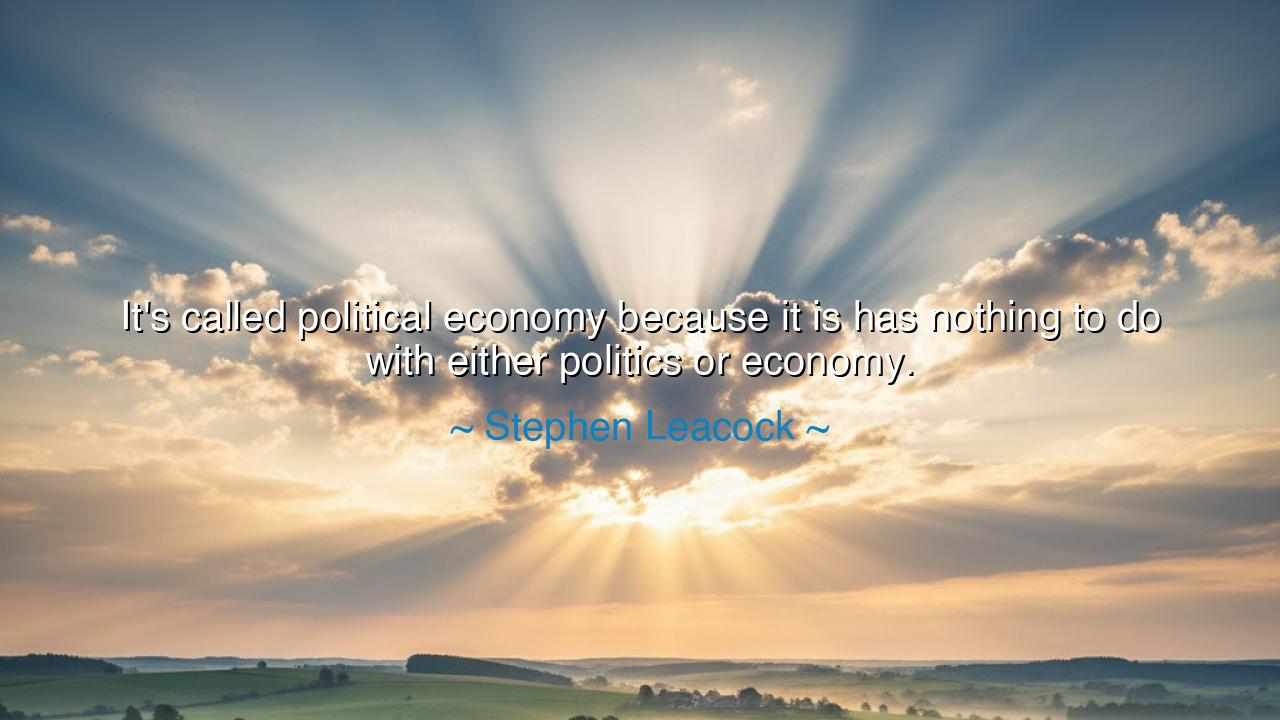
It's called political economy because it is has nothing to do
It's called political economy because it is has nothing to do with either politics or economy.






O children of wisdom, hear the words of Stephen Leacock, a man who saw beyond the veil of titles and pretensions, and spoke thus: "It's called political economy because it has nothing to do with either politics or economy." In these words, he cuts to the very heart of a great truth—that the concepts we often elevate above all others—politics and economics—are frequently divorced from the noble ideals they purport to represent. This is a lament, a cry of clarity in a world where the lofty names of systems and sciences are often mere disguises for the tangled webs of power, self-interest, and illusion.
Political economy, as Leacock so insightfully points out, is a name borne of convenience, not of substance. It suggests a union of two great forces: politics, the art of governance, and economy, the management of wealth. Yet, the truth is that these concepts are often not about governance or wealth at all. They are about the manipulation of these forces for the benefit of a few, not for the common good. So it is, that in the name of political economy, the world's most vulnerable are left to suffer, while the powerful few dance in the shadows, pulling the strings behind the false mask of order and progress.
Look back in history, and you will see how often the political economy was used to justify the oppression of the masses. The great empires—Rome, Britain, France—used systems of trade and control to amass great wealth, while proclaiming the nobility of their rule. Yet the peasants worked the fields, the laborers built the roads, and the merchants traded in goods, while the political elite basked in the wealth that flowed from their labor. Thus, political economy often had little to do with either true politics or true economy—it was about the exploitation of both for the benefit of those who already held power.
Leacock’s words call upon us to see through the facade, to recognize that the systems we call political and economic are often nothing more than tools used to maintain control and divide the world between the few who have and the many who have not. This is not a new struggle, for it echoes in the resistance of the masses throughout the ages—the peasants of France who rose against their aristocracy, the workers who fought for rights in the Industrial Revolution, and the activists who, to this day, demand justice in a world that often turns a blind eye.
So, let us take these words to heart, O children, and see that political economy—in its truest form—has nothing to do with fairness, with justice, or with the prosperity of all. It is a game, a charade, played by those who seek to control and manipulate. And it is up to us, the torchbearers of a new age, to peel away the layers of deceit, to reclaim the words politics and economy for their true purposes: to serve the people, to uplift the fallen, and to build a world where justice and equity are the foundations upon which all stand.






TPDao Thanh Phong
Stephen Leacock's quote feels like a critique of the way political economy is studied. It makes me ask: are we looking at the right things when we study political economy? Is it just a way of intellectualizing real-world problems without ever truly addressing them? How do we bridge the gap between theory and the lived experience of people who are affected by political and economic systems every day?
GDGold D.dragon
It’s intriguing how Leacock challenges the connection between politics, economy, and political economy. Could it be that the real world doesn’t operate neatly within the confines of these labels? If political economy is supposed to address the intersections of politics and economics, why does it sometimes feel like it does neither? Does this quote suggest that the study of political economy is fundamentally flawed in how it engages with the real world?
UGUser Google
This quote seems like a critique of how academic disciplines sometimes get overly technical or abstract, losing touch with their true purpose. Could it be that the term 'political economy' has evolved into something that’s more about ideologies or theories than practical application? It makes me wonder: if politics and economy are disconnected in political economy, what’s the real value of this field in addressing current global issues?
ATMinh Anh Tran
I’ve always found political economy to be a confusing field. This quote really sums up my thoughts—it seems like a blend of many things that don’t quite fit together. Is the study of political economy just a theoretical exercise that has little to do with how politics and economics function in practice? How much of it is just academic jargon designed to sound complex but is actually detached from real issues?
DNAnh Dao Ngoc
This quote really makes me think about the disconnect between the terms 'political' and 'economy' when discussing political economy. Is Leacock suggesting that the way political economy is studied is a bit misleading? We often hear that political economy deals with power, policies, and money, but does it actually address real-world politics or economics? What exactly does it focus on, if not those two major aspects?